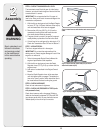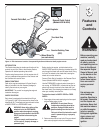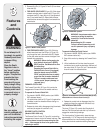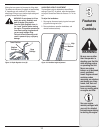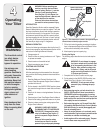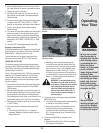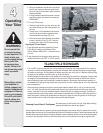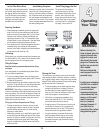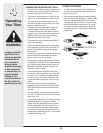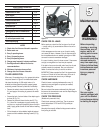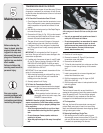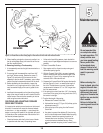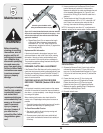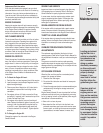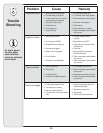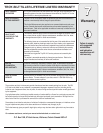
16
Loading and unload-
ing the tiller into a
vehicle is potentially
hazardous and we
don’t recommend
doing so unless
absolutely necessary,
as this could result
in personal injury or
property damage.
However, if you
must load or unload
the tiller, follow the
guidelines given next.
4
Operating
Your Tiller
WARNING
LOADING AND UNLOADING THE TILLER
• Before loading or unloading, stop the engine, wait for
all parts to stop moving, disconnect the spark plug
wire and let the engine and muffler cool.
• The tiller is too heavy and bulky to lift safely by one
person. Two or more people should share the load.
• Use sturdy ramps and manually (engine shut off)
roll the tiller into and out of the vehicle. Two or more
people are needed to do this.
• The ramps must be strong enough to support the
combined weight of the tiller and any handlers.
The ramps should provide good traction to prevent
slipping; they should have side rails to guide the tiller
along the ramps; and they should have a locking
device to secure them to the vehicle.
• The handlers should wear sturdy footwear that will
help to prevent slipping.
• Position the loading vehicle so that the ramp angle is
as flat as possible (the less incline to the ramp, the
better). Turn the vehicle’s engine off and apply its
parking brake.
• When going up ramps, stand in the normal operating
position and push the tiller ahead of you. Have a
person at each side to turn the wheels.
• When going down ramps, walk backward with the til-
ler following you. Keep alert for any obstacles behind
you. Position a person at each wheel to control the
speed of the tiller. Never go down ramps tiller-first,
as the tiller could tip forward.
• Place wooden blocks on the downhill side of the
wheels if you need to stop the tiller from rolling down
the ramp. Also, use the blocks to temporarily keep
the tiller in place on the ramps (if necessary), and
to chock the wheels in place after the tiller is in the
vehicle.
• After loading the tiller, prevent it from rolling by
engaging the wheels in the WHEEL DRIVE position.
Chock the wheels with blocks and securely tie the
tiller down.
• To create a terrace, start at the top of the slope and
work down. Go back and forth across the first row as
shown in Fig. 4-10.
• Each succeeding lower terrace is started by walking
below the terrace you’re preparing. For added
stability of the tiller, always keep the uphill wheel in
the soft, newly tilled soil. Do not till the last 12” or
more of the downhill outside edge of each terrace.
This untilled strip helps prevents the terraces from
breaking apart and washing downhill. It also provides
a walking path between rows.
TERRACE GARDENING
• To create a terrace, start at the top of the slope and
work down. Go back and forth across the first row as
shown in Figure 4-10.
• Each succeeding lower terrace is started by walking
below the terrace you’re preparing. For added stability
of the tiller, always keep the uphill wheel in the soft,
newly tilled soil. Do not till the last 12” or more of the
downhill outside edge of each terrace. This untilled
strip helps prevent the terraces from breaking apart
and washing downhill. It also provides a walking path
between rows.
Fig. 4-10



